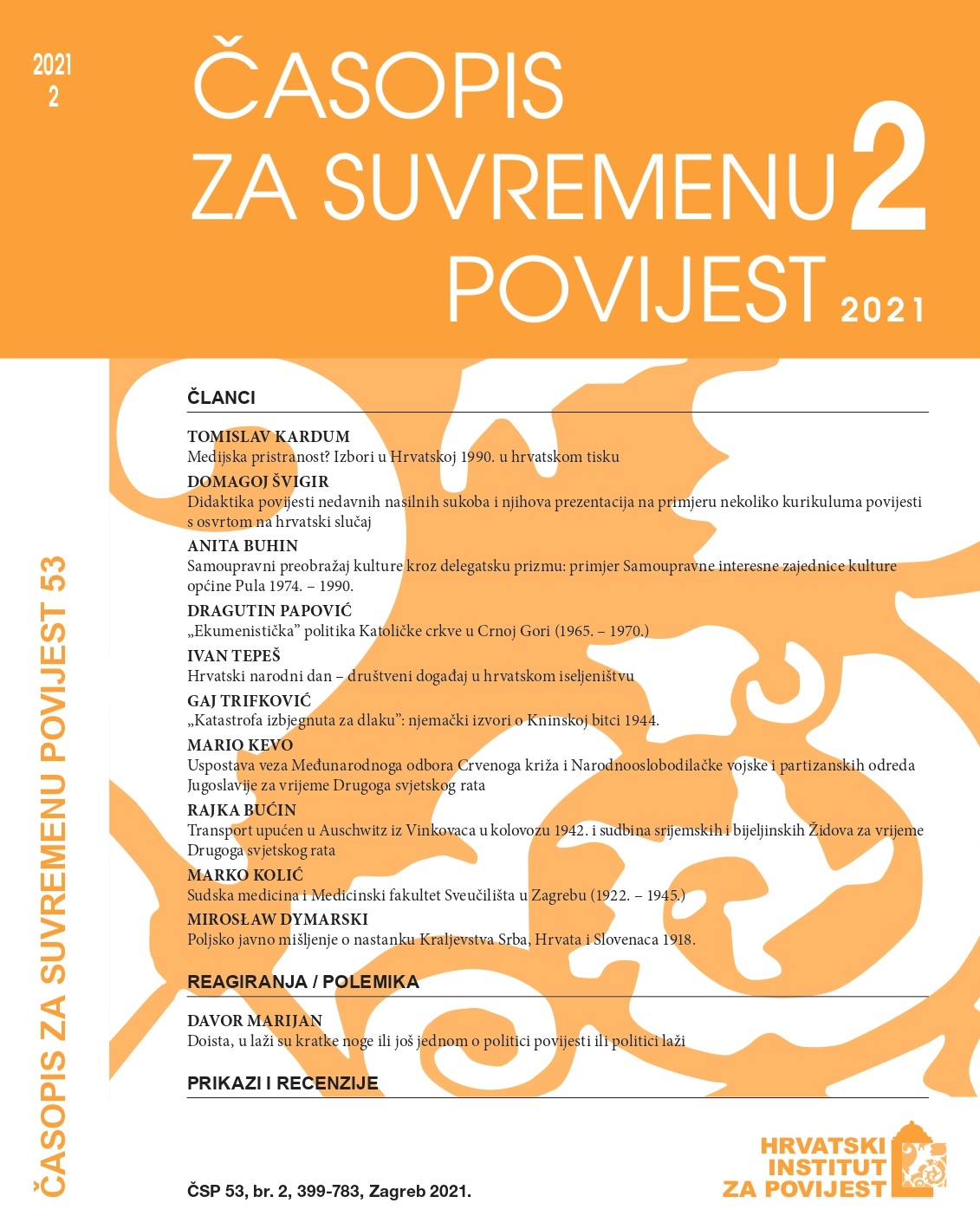Uspostava veza Međunarodnoga odbora Crvenoga križa i Narodnooslobodilačke vojske i partizanskih odreda Jugoslavije za vrijeme Drugoga svjetskog rata
The Establishment of Relations between the International Committee of the Red Cross and the People’s Liberation Army and Partisan Detachments of Yugoslavia during World War II
Author(s): Mario KevoSubject(s): History, International relations/trade, Health and medicine and law, WW II and following years (1940 - 1949), Fascism, Nazism and WW II
Published by: Hrvatski institut za povijest
Keywords: World War II;International Committee of the Red Cross (ICRC);Yugoslavia;Independent State of Croatia (ISC);People’s Liberation Movement;People’s Liberation Army and Partisan Detachments of Yugoslavia;
Summary/Abstract: The active role of the International Committee of the Red Cross (ICRC) comes to the fore in wartime circumstances, in carrying out activities based on international war law (the Geneva and Hague Conventions) regarding providing assistance to all war victims. In securing working conditions during World War II, the ICRC attempted to establish official relations with all belligerent parties regardless of whether they were or were not recognised as belligerent parties. Therefore, the author presents part of the ICRC efforts made in the process of recognising the international war law-regulated status of belligerent party to members of the People’s Liberation Army and Partisan Detachments of Yugoslavia, i.e. the status of prisoners of war. Despite some earlier contacts, after the designation of a permanent representative to the Independent State of Croatia (1943), the ICRC launched extensive activities in favour of members of the Yugoslav Partisan movement, the most important of which was the practical application of the international law of war. Permanent representative Schmidlin constantly intervened in the ministries and the prime minister of the Independent State of Croatia through the Central Office of the Croatian Red Cross and as well through prominent figures in the political and social life of the State. However, although the Partisans de facto achieved the position of a belligerent party in their relations with the German military forces, this status was strongly opposed by the ISC authorities.Due to the change in the British attitude towards the Yugoslav Partisans, in the summer of 1943 the ICRC leadership ordered its permanent representative in Zagreb to establish contact with members of the People’s Liberation Army of Yugoslavia as soon as possible. Very soon, Schmidlin contacted the Supreme Headquarters of the People’s Liberation Army and Partisan detachments of Yugoslavia. In late November 1943, shortly after the beginning of the Allied Conference in Tehran, the ICRC leadership also received an Allied recommendation on the same subject. The existence of the Yugoslav Committee of the Red Cross in London, which had legitimacy and was the only recognised Yugoslav national Red Cross society, was a major problem in establishing relations between the ICRC and the Yugoslav Partisans. The ICRC leadership remained committed to not recognising the new societies created during the war. After the signing of the Tito-Šubašić agreement in mid-June 1944, the ICRC leadership changed its position, and representatives of the Yugoslav government and Marshal Tito sent several letters to the ICRC Permanent Delegation in London in late September and early October 1944. In those letters, they informed the ICRC leadership of the establishment of the Central Committee of the Yugoslav Red Cross on the island of Vis. At the same time, the Royal Yugoslav Red Cross Society in London was dissolved. All of this resulted in the unification of the national organisation of the Red Cross in Yugoslavia, which led to the establishment of official relations between the ICRC and Yugoslav Partisans at the end of 1944. Based on original archival sources and literature, the author points to some aspects of cooperation until the end of World War II and in the early post-war period. One of the main aspects of the ICRC’s work during this period was the practical application of the provisions of the international law of war to prisoners of war in Yugoslavia. Tito himself made the same promises, though the Yugoslav Ministry of Social Policy made this conditional: they would be applied only if it was proven that captured members of the Partisan movement had been treated in the same way during the war. The treatment of prisoners of war in Yugoslavia could only be speculated about, and the authorities immediately refused to allow foreign diplomatic or ICRC representatives to gain insight into the treatment of prisoners of war. It is clear that the ICRC faced the same problems in its relations with the authorities of the Independent State of Croatia and the German Reich during the war and the Yugoslav authorities at the end of the war and in the immediate post-war period.
Journal: Časopis za suvremenu povijest
- Issue Year: 53/2021
- Issue No: 2
- Page Range: 571-609
- Page Count: 39
- Language: Croatian

